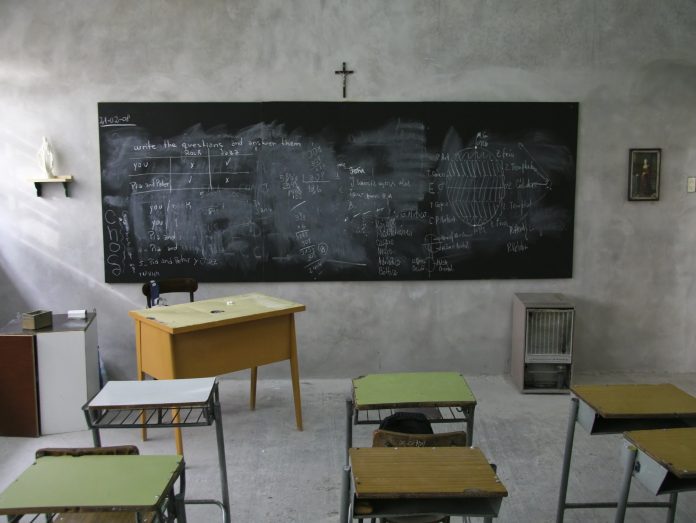
by Kate Ristow
[CLICK HERE] for a Catechist Formation Interest Survey.
Whew! What a relief! After months of following up on leads, networking, interviewing, praying, and a little cajoling, all—or almost all—of your catechists are on board! Congratulations! Celebrate your success, but recognize that now is not the time to rest on your laurels. A religious education program is only as good as the well-trained and faith-filled catechists in place in every classroom.
The Staff as a Whole
Parish catechists—in most cases, volunteers all—come to their ministry with varied backgrounds. There may be cradle Catholics, steeped in faith since infancy; there may be converts, recently welcomed into the Church through the Rite of Christian Initiation of Adults (RCIA). Still others may be lackadaisical Catholics who volunteered as a means of reconnecting with the Church or growing in faith alongside their children. You may have catechists who volunteered out of a sense of obligation (“It’s my turn to help out”).
What’s more, catechists come from every imaginable walk of life. Your staff might be composed of an IT technician, a handful of stay-at-home moms, a gym teacher, business people, medical personnel, grocery clerks—in short, any member of the Catholic community in your town.
Finally, you have both rookie and veteran catechists. They all come with attitudes, questions, and opinions, as well as positive and negative Church and/or educational experiences. Your task is to help them become a team of modern-day apostles who will spend the next nine months following Jesus’ command to “make disciples of all nations” (Matthew 28:19). To do this successfully, you need to offer them the formation and skills they will need to share faith with their students.
Reflect: Think about the newly formed catechetical staff as a whole. What positive qualities do they bring to their ministry? What are your goals for enriching their growth in faith and teaching skills?
Responding to God’s Gift
Formation is the process by which we help catechists respond to God’s gift of faith—the invitation to know, love, and serve God and all that he has revealed through Jesus and the Church. Through formational experiences, catechists grow in faith by deepening their spirituality and relationship with the Lord. They increase their understanding of the faith in areas such as the four pillars of faith found in the Catechism of the Catholic Church: Creed, Sacraments, Morality, and Prayer.
As catechetical leaders, we form catechists so that they are able to recognize and further develop how faith is “known, celebrated, lived, and expressed in prayer” (National Directory for Catechesis, n. 20) in their own lives. In turn, the personal formation of catechists increases their desire to help others grow in faith.
There is a distinct relationship between personal formation and a catechist’s ministry in the classroom. For example, a catechist participating in a course about the Holy Trinity might be inspired by what she learns or experiences to create an age-appropriate activity that helps her students better understand what Catholics believe about this great mystery of faith. Formation, then, enables catechists to share the gospel message with their students.
The General Directory for Catechesis tells us that there are three dimensions of formation: being, knowing, and savoir-faire (see n. 238). Formation enables catechists to appreciate who they are as people of faith (“being”). Formation makes it possible for catechists to understand the message, or what they are called upon to teach (“knowing”). This includes the theology of our faith—the doctrines, dogmas, and truths that we believe as Catholics. Finally, formation increases catechists’ savoir –faire, a French phrase that means “to know how to do.” Formation gives catechists the skills they need to teach effectively. This area includes things like classroom management and discipline, how to pray with kids, using Scripture in the classroom, and so forth.
Reflect: Where is your greatest strength: being, knowing, or savior-faire? Which of these dimensions do you emphasize most with your staff?
The Certification Issue
Most dioceses have some sort of certification program. Some require catechists to begin to work toward certification in their first year; others delay enrollment in a certification program until the second year. Most dioceses offer several levels of certification, beginning with “basic.”
The number of hours required for the initial level of certification varies from diocese to diocese, as does the time permitted to complete the initial level of certification and the course work that is acceptable. Although most dioceses will accept credit hours toward certification from another diocese, some additional paperwork may be required.
Catechetical leaders need to know all the requirements and variables in order to explain the program fully to catechists. When you talk with your staff, be sure to emphasize how your parish and diocese honor catechists who reach certification!
Let’s face it: Catechists are busy people. The easiest and most effective way to incorporate formation into your parish program is to bring the staff together for regularly scheduled catechist meetings. The first catechist meeting—when you outline policies and procedures, distribute class lists, assign classrooms, and answer questions—is also the best time to lay out the agenda for formation sessions throughout the year. If you have not yet emphasized the importance of formation with your staff, now would be the time to do it.
If you participate in a diocesan certification program, explain how your parish catechist meetings will help the staff painlessly earn clock-hour credits toward certification. If possible, give catechists a vote in choosing the areas or courses required for certification that they are interested in for group study. Have them choose from required certification topics such as Catholic Morality, the New Evangelization, Social Justice, or the Person of Jesus. If that decision has already been made by you or last year’s catechists, briefly introduce the topic(s) that will be the focus of study during the coming year and how the topic(s) will be presented during catechist meetings.
Parish Formation Meeting
The advantage of providing formation opportunities “at home” in your parish at regularly scheduled catechist meetings is that it enables catechists to multi-task. They can grow in their own faith, interact and build relationships with peers, and still have time during each meeting to do lesson planning at their individual grade levels. All of this can be done easily in a two-and-a-half-hour format once a month. Below is a proposed schedule for a typical catechist meeting with a built-in formation component. It can easily be adjusted to accommodate a shorter or longer time frame.
7:00 p.m. Welcome/Opening Prayer
7:15 p.m. Presentation of formation topic, including input, opportunities for personal
faith-sharing and interaction related to the topic
8:15 p.m. Break
8:30 p.m. Lesson planning and announcements
9:15 p.m. Closing Prayer
Alternative Formation Models
Some catechetical leaders prefer to move formational experiences away from the busyness and task-focused atmosphere of a normal catechist meeting. Below are several options. Keep in mind that it is not necessary to use the same model for all formation sessions. Mixing things up keeps everyone on their toes and may help to breathe new life into your efforts.
Retreat days: Plan an offsite, day-long (9 a.m. to 3 p.m.) experience for catechists focused completely on one area—prayer or Scripture, for example. If possible, plan the retreat at a time of year and a locale that allows catechists to spend quiet time alone, walking the grounds.
Evenings of reflection: During Advent or Lent, or an evening early in Holy Week, invite catechists to come together to reflect on the season. Include music, Scripture, and opportunities for personal journaling as part of the process. Aim for simplicity. For example, focusing on the Stations of the Cross can be a powerful and formative experience for catechists, away from the responsibility of supervising a class during this devotion. While this experience is unlikely to fulfill a course requirement, it can be counted as a partial credit in most dioceses. Check with diocesan staff for specific information.
Sunday mornings: Gather for three Sunday morning formation sessions over the course of the year following a mid-morning Mass. You might focus on the Trinity, and spend a separate Sunday on each Person of the Holy Trinity. Ask a parent committee to organize a continental breakfast or a simple lunch.
Or: Consider other opportunities for formation: the annual parish mission, diocesan workshops or conferences, interactive online classes, closed-circuit courses. The key is to give your catechists as many options as possible for growing in faith and their ministry. You want to guard against what Dietrich Bonheoffer called “cheap grace” (in regards to the Sacraments). In this case, although we want to make certification an achievable goal, we don’t want to water down the requirements to the point that the credits do not produce authentic growth.
Overcoming Objections
While most catechists want to be the very best they can be, a few volunteers usually express resistance to a formation program. Here are some ideas for responding to that resistance:
“I signed up to teach—not to attend classes.” These sessions will help you in your ministry. Participate in the first session and see for yourself. I know if you give the process a chance, you’ll see the value.
“I’m a busy person. I simply don’t have the time!” I respect that you are very busy, but I’m sure you will find this course (workshop/session) well worth your time. Plus, I know your input will be invaluable to your fellow catechists. I’m looking forward to you being with us!
“I attended Catholic schools for 16 years and I go to Mass every week. I’ve been a catechist for three years. What can you teach me that I don’t already know?” More and more, we are called to recognize the importance of lifelong learning. What you learned about Jesus in high school or college, for example, has matured and deepened over the years. Come share your insights and listen to how others have grown in their faith.
Be Flexible!
Understand that not every catechist will be able to attend every event you plan. Avoid overscheduling the staff with extra sessions every month. Form a small catechist committee to help plan formation events. The more input you have from the staff, the more success you will have. Publicize applicable events beyond your own parish and encourage catechists to participate.
Presentation Resources
The input for your sessions can come from a variety of resources: local speakers approved by your diocese; videos or DVDs recommended as options for certification in a given theological field; parish priests or deacons; you or another catechetical leader from your area who is well-versed in the appropriate topic.
Certification programs usually list the criteria that must be presented for each course. These benchmarks should be shared with speakers to keep them on task and to ensure that important aspects of each topic are fully addressed.
Catholic publishing companies have worked with national catechetical organizations and dioceses to provide comprehensive catechist formation programs. Check with your diocesan office to determine how published programs can be incorporated into parish formation to meet certification guidelines or requirements.
Rome Wasn’t Built in a Day
The formation of catechists does not—and should not—take place overnight. It is a process that does not respond well to haste or impatience. A certification course might call for five clock hours to complete a given theological course. That should not deter you from making formation part of your regular catechist meetings. Yes, it will take you five sessions to complete the requirements of the course, but consider how thoroughly steeped in the topic your catechists will be! If courses are chosen wisely and catechists are offered interesting and challenging presentations—along with opportunities for reflection, discussion, questions, and application—they will surely grow in faith.
Aesop’s fable “The Tortoise and the Hare” shows us the merits of working slowly and consistently to achieve a worthwhile goal. Help your catechists appreciate that catechist formation is not a race. Rather, it is a process that benefits not only them but also their students.
Reflect: How will you approach formation differently this year? What impact will your decision have on your program?
Kate Ristow, Contributing Editor to CATECHIST, has worked in Catholic publishing for over 30 years as a national speaker and writer, building on a wealth of experience in the religious formation of children and catechists in both parish and Catholic school programs.
Copyright 2014, Bayard, Inc. All rights reserved. This article is protected by United States copyright and other intellectual property laws and may not be reproduced, rewritten, distributed, redisseminated, transmitted, displayed, published or broadcast, directly or indirectly, in any medium without the prior written permission of Bayard, Inc.
This article was written by the Catechist Staff and appeared in Catechist magazine, January 2014.
Image Credit: Shutter Stock 36076513




